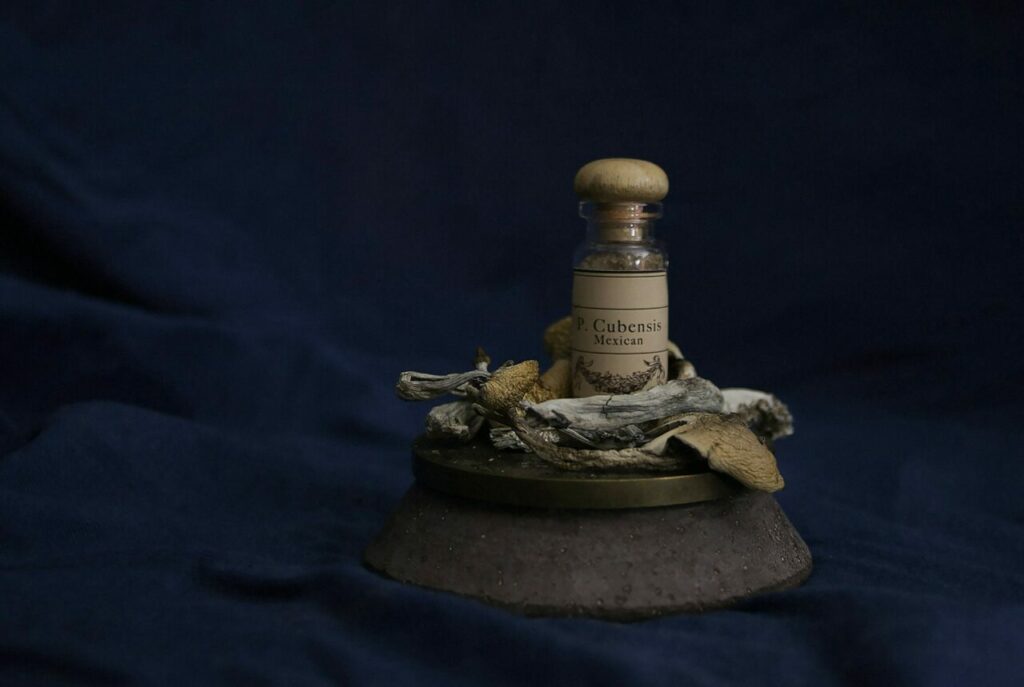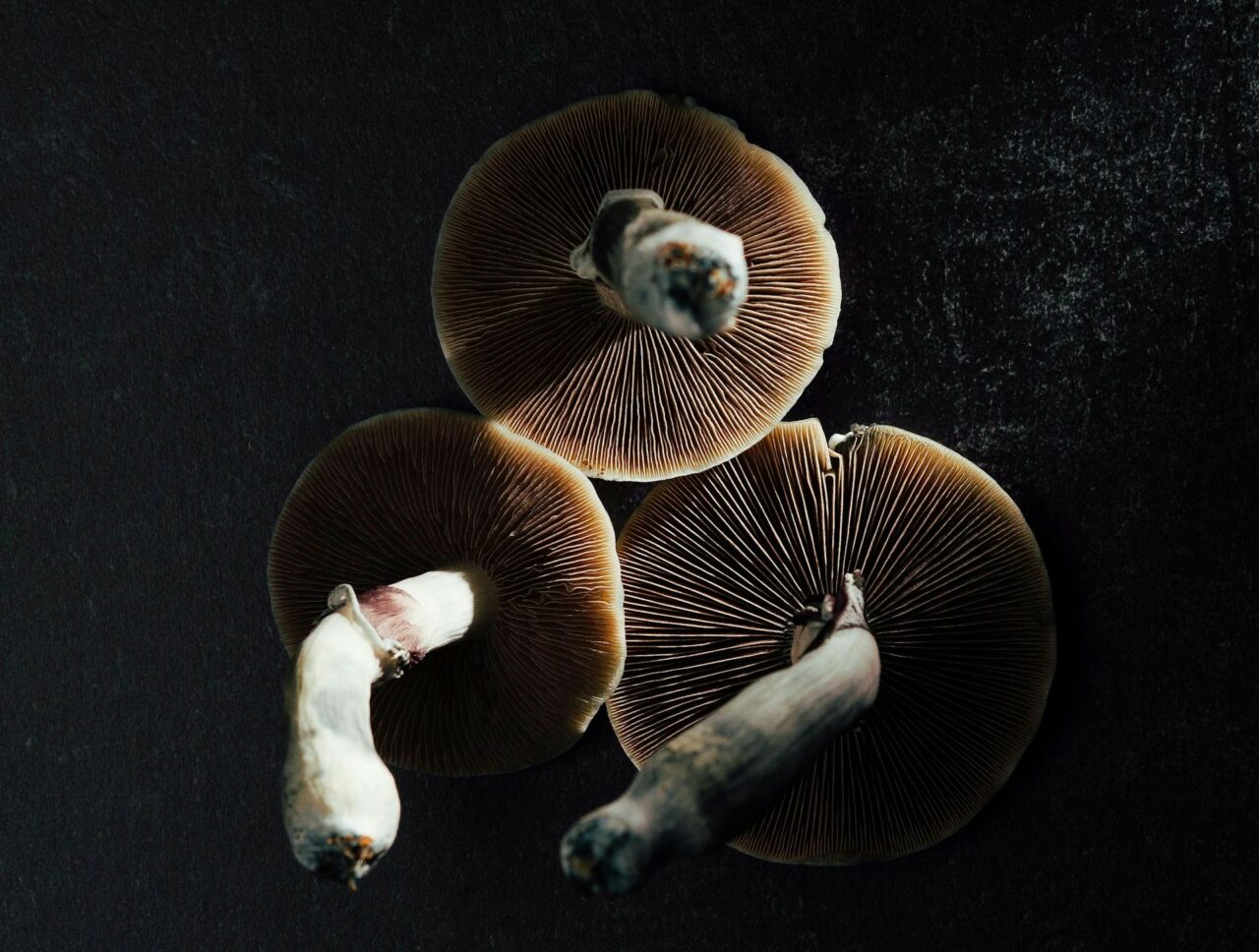The rising interest in natural magic mushrooms in Canada has paralleled a similar growth in the popularity of lab-made psilocybin products. Many researchers prefer these lab-manufactured products due to the consistency in dosage they offer. However, it’s important to note that natural mushrooms can often outperform their synthetic versions in terms of potency. Experts have identified marked differences between the two, including their strength levels which tend to vary.

Key Takeaways:
- There are over 180 species of natural mushrooms, each offering varying levels of potency. The effects of these mushrooms can be influenced by factors such as species type, consumption method, cultivation conditions, and individual tolerance.
- Synthetic psilocybin is a lab-created version of the organic compound. It is manufactured in controlled settings to ensure uniformity and purity, which is particularly important for clinical research, especially in the field of mental health treatments.
- Psychedelic mushrooms contain various compounds like psilocin and baeocystin that interact to produce an experience more intense and profound than any single compound could offer.
Emerging Market: Psychedelics in Diverse Forms
Psilocybin mushrooms are gaining ground in Canada, particularly as a treatment for mental health conditions like OCD, depression, PTSD, and anxiety. This surge in interest has prompted provincial governments to contemplate the decriminalization of recreational use.
In 2020, Canada allowed the restricted medical use of these mushrooms under certain circumstances. As recently as last year, the federal government granted permission for specific terminally ill patients to use these substances as part of their symptom management.
These forward-thinking changes have prompted the development of synthetic psychedelics.
The Ongoing Debate
The continuous discussion around organic versus lab-produced psychedelics revolves around factors such as safety, accessibility, and cost.
Many believe that natural psychedelics provide a more comprehensive and traditional experience. However, supporters of synthetic versions argue for their ease of standardization for medical applications, coupled with guaranteed dosage control and quality assurance.
While lab-made psychoactive substances could increase accessibility, concerns remain about potential drug monopolization. Critics warn that this could result in less for users who require accessibility features.
Comprehending Psilocybin: A Comprehensive Guide
Psilocybe cubensis, a specific type of magic mushroom, is one of the myriad natural psychedelic substances accessible today. Magic mushrooms, renowned for their psychoactive properties, are available in a variety of strains including Golden Teachers, Amazonian Cubensis, Blue Meanies, among others, with Psilocybe cubensis being the most predominant species.
Deciphering the Psychedelic Mechanism
Psilocin, a derivative of this mushroom, metabolizes into a distinct chemical in the liver. This resultant compound engages with the brain’s serotonin receptors, with a particular emphasis on the 5-HT2A receptor.
This receptor plays an instrumental role in mood regulation, cognitive functions, and perception. Its interaction with the transformed compound alters the standard operations of serotonin pathways, which results in changed visual and auditory perception, shifts in thought processes, and emotional states. This occurrence leads to an enhanced mood, amplified creativity, introspective experiences, and the characteristic “psychedelic” sensations.
The Two Primary Types
| Natural | Found in more than 180 species of fungi, the strength of the effects varies depending on the mushroom species. Psilocybe cubensis is a common variant. The impact can vary based on methods of consumption, cultivation techniques, and individual tolerance. |
| Synthetic | Manufactured in labs and chemically identical to natural compounds. They are synthesized in controlled settings to maintain consistency and purity. These are progressively being studied for potential clinical uses, particularly in the realm of mental health therapies. |
Contrasting Nature’s Offering and Science’s Invention: The Fundamental Differences
Natural variants of these substances are found in specific species of magic mushrooms. Indigenous societies in North and South America have utilized these mushrooms in their rituals and ceremonies, deeming them to be sacred or divine.
- Derived from plants and mushrooms
- Utilized in ancient ceremonies and therapeutic practices
- The unique genetic structure of each strain determines its potency
On the other hand, the
A synthetic drug is
A substance that closely mirrors the chemical structure of a particular compound in nature. These drugs are meticulously engineered by professionals in controlled settings to ensure precision. While they act in a similar manner to natural drugs, they have the potential to alter the overall psychedelic experience.
- Formulated by experienced pharmaceutical experts
- Recent advancements intended for medicinal usage
- Distinguished strength due to the standardized production process
Natural substances provide more advantages due to their bioactive elements. Various types of mushrooms can contain different levels of psilocybin and other compounds, resulting in a range of effects.
Researcher’s Insights
A study undertaken at Hebrew University revealed that psychedelic mushrooms have a more potent and enduring impact on synaptic plasticity compared to their synthetic counterparts. The research group examined how the drug affected the brain activity of mice by analyzing changes in behavior and specific brain chemicals.
The research discovered that the extract reduced head twitches and promoted the formation of new brain connections. This suggests that the mushroom extract could provide more advantages than a single compound.
The researchers also introduced the concept of the “entourage effect”. They described it as the occurrence where the combined effect of multiple compounds in psychedelic mushrooms could be more powerful than the effect of individual compounds. Within the scope of mushrooms, psilocin, baeocystin, and other tryptamines may synergistically contribute to a profound experience.
These additional chemicals are absent in lab-produced substances, which may result in minor variations in effects, even if the psychedelic content is the same.
Expert Opinions on Nature’s Superiority
Research consistently suggests that psilocybin—regardless of its form—yields promising results for the treatment of various psychiatric disorders. A study in 2024 examined the effects of controlled substances on patients with treatment-resistant depression. It observed symptom improvements following the administration of magic mushrooms.
When paired with other treatments, organic psychedelics could facilitate deeper emotional processing and insights during therapy sessions, thereby enhancing long-term results.
Scientists from the same university have noted that hallucinogenic mushrooms boost synaptic plasticity. They possess a unique metabolic profile that affects oxidative stress and energy production pathways, unlike synthetic psychedelics.
Market Consequences
The growing body of research on this subject could shape Canadians’ perspectives on and consumption trends of psychedelics. Preliminary efforts by Health Canada, like the Special Access Program, are displaying hopeful indications of leading the way to legalization and revolutionizing the therapeutic landscape. Psilocybin-assisted therapy might become a dominant treatment method in the near future.
The importance of organic options is projected to rise in clinical trials and therapeutic settings. As the country progresses towards fully recognizing the potential of organic psychedelics, significant progress in mental health treatment appears to be on the horizon.
Guidelines for Safely Procuring Shrooms in Canada
- Section 56 Exemption: Health Canada recognizes that patients with severe medical conditions might use psilocybin as an alternative therapy. This exemption is part of the Controlled Drugs and Substances Act.
- Clinical Trials: Initial clinical trials are approved to investigate the drug’s potential for addressing mental health disorders. Participants are required to meet certain requirements and undergo medical assessment.
- Online Market: Psilocybin capsules or edibles can be purchased from online sellers in Canada, but it’s crucial to buy from reliable sources.
Explore the Power of Natural Substances
Nature is abundant with marvels, and shrooms are one of them. Instead of turning to synthetic psychedelics, think about using naturally potent magic mushrooms from Canada. They’re therapeutic and powerful. Discover the best, naturally derived shroom strains at Magic Mushrooms Vancouver Canada.
The shrooms we have available exceed the standard by preserving their purest and most natural composition in a dried state. Make your purchase today and receive your chosen products, conveniently and discreetly delivered to your door.
Frequently Asked Questions
What are baeocystin and norbaeocystin?
Both are tryptamine or indole alkaloids. They share a chemical similarity with psilocybin. These tryptamine derivatives act as secondary alkaloids in shrooms, enhancing the overall psychedelic experience, though to a lesser extent. Baeocystin and Norbaeocystin have a similar chemical structure but differ in their psychoactive properties.
Are organic dried mushrooms contained in capsules and edibles?
Your experience may vary depending on the source. Online dispensaries offer products loaded with organic compounds, allowing for a full entourage effect. In contrast, synthetic compounds, often found in capsule form, are typically used in clinical trials and medical clinics.
Do natural psychedelics offer deeper experiences?
One must bear in mind that expecting an intense experience from a natural psychedelic can indeed lead to that exact result. This is because our expectations, which form part of the ‘set’, can guide the journey. Natural psychedelics, often linked with ceremonial traditions, can elicit uniquely rewarding experiences thanks to their ritualistic context. These experiences stand apart from clinic sessions that involve synthetic compounds in several ways.





